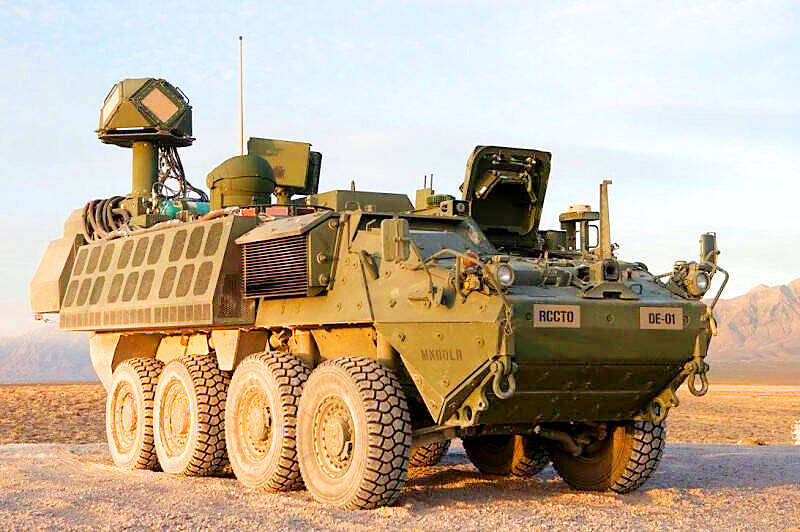Taiwan is poised to roll out a prototype 50-kilowatt (kW) vehicle-mounted laser weapon system by the end of the year, thanks to technical breakthroughs made possible through global assistance, a defense official said yesterday on condition of anonymity.
The project, which last year produced a low-powered prototype, is expected to create a full-powered system mounted on CM-32 Clouded Leopard wheeled armored vehicles for use against missiles and uncrewed aerial vehicles, the official said.
The state-run Chungshan Institute of Science and Technology has made great advancements in the project over a relatively short period with technological assistance from “international friends,” they said.

Photo: screen grab from Raytheon’s Web site
A 50kW laser possesses enough raw power output for combat applications, and the institute hopes that the system would be adopted by Taiwanese armed forces following the completion of trials and demonstrations, they said.
Members of the institute involved in the project have published articles in military journals exploring the operational potential of coupling directed-energy weapons with the army’s AN/TWQ-1 Avenger air defense vehicles, the official said.
The articles discuss the possible utilization of a laser system against the Chinese People’s Liberation Army’s Chengdu GJ-1 series of drones, as well as rocket and missile weapons, they said.
Directed-energy weapons are an emerging class of air-defense systems being developed to supplement conventional weapons, which are more expensive to fire and could be overwhelmed by a large number of drones or missiles.
Former Israeli prime minister Naftali Bennett has said that the estimated cost for intercepting Hamas missiles with a laser weapon is about US$3.50 per shot, whereas a Tamir interceptor, utilized in Israel’s Iron Dome system, costs US$40,000 to US$50,000.
Earlier this week, US defense media reported that four Directed Energy Maneuver-Short Range Air Defense prototypes had been dispatched to the Middle East to test “real-world applicability” operating in dusty conditions.
Directed-energy weapons are electromagnetic systems that convert chemical or electrical energy to radiate focused energy on a target to cause physical damage that degrades, neutralizes, defeats or destroys a hostile capability, according to the US Office of Naval Research.

‘DENIAL DEFENSE’: The US would increase its military presence with uncrewed ships, and submarines, while boosting defense in the Indo-Pacific, a Pete Hegseth memo said The US is reorienting its military strategy to focus primarily on deterring a potential Chinese invasion of Taiwan, a memo signed by US Secretary of Defense Pete Hegseth showed. The memo also called on Taiwan to increase its defense spending. The document, known as the “Interim National Defense Strategic Guidance,” was distributed this month and detailed the national defense plans of US President Donald Trump’s administration, an article in the Washington Post said on Saturday. It outlines how the US can prepare for a potential war with China and defend itself from threats in the “near abroad,” including Greenland and the Panama

A magnitude 4.9 earthquake struck off Tainan at 11:47am today, the Central Weather Administration (CWA) said. The hypocenter was 32.3km northeast of Tainan City Hall at a depth of 7.3km, CWA data showed. The intensity of the quake, which gauges the actual effect of a seismic event, measured 4 in Tainan and Chiayi County on Taiwan's seven-tier intensity scale, the data showed. The quake had an intensity of 3 in Chiayi City and County, and Yunlin County, while it was measured as 2 in Kaohsiung, Nantou County, Changhua County, Taitung County and offshore Penghu County, the data showed. There were no immediate reports of

The Chinese Nationalist Party (KMT) is maintaining close ties with Beijing, the Democratic Progressive Party (DPP) said yesterday, hours after a new round of Chinese military drills in the Taiwan Strait began. Political parties in a democracy have a responsibility to be loyal to the nation and defend its sovereignty, DPP spokesman Justin Wu (吳崢) told a news conference in Taipei. His comments came hours after Beijing announced via Chinese state media that the Chinese People’s Liberation Army’s Eastern Theater Command was holding large-scale drills simulating a multi-pronged attack on Taiwan. Contrary to the KMT’s claims that it is staunchly anti-communist, KMT Deputy

RESPONSE: The government would investigate incidents of Taiwanese entertainers in China promoting CCP propaganda online in contravention of the law, the source said Taiwanese entertainers living in China who are found to have contravened cross-strait regulations or collaborated with the Chinese Communist Party (CCP) could be subject to fines, a source said on Sunday. Several Taiwanese entertainers have posted on the social media platform Sina Weibo saying that Taiwan “must be returned” to China, and sharing news articles from Chinese state media. In response, the Mainland Affairs Council (MAC) has asked the Ministry of Culture to investigate whether the entertainers had contravened any laws, and asked for them to be questioned upon their return to Taiwan, an official familiar with the matter said. To curb repeated